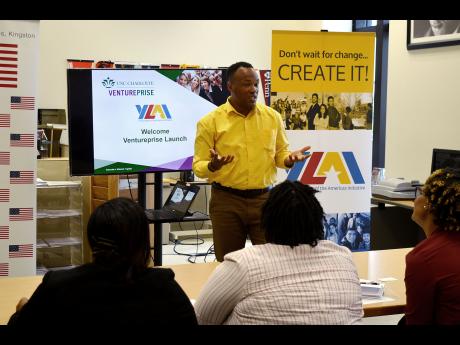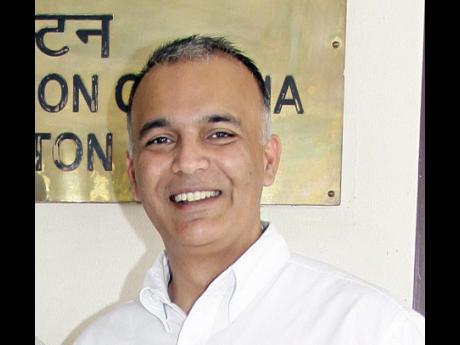Life in innovation driven economy
"Corporates don't create jobs, start-ups do," said Devin Collins, associate director, Ventureprise business accelerator and incubator at UNC Charlotte.
Redefining the way we perceive academia and how it can integrate seamlessly into the contemporary, rapidly evolving contemporary world of work, is what Collins does as his 'day job', if we may.
In a recent visit to Jamaica, he had discussions with entrepreneurs and gave them an insight into the best practices, the role of academia in driving and development of job creation through innovation, among other areas.
He came to Jamaica, in part, as a follow-up visit of young Jamaican entrepreneur Dave Oakley, founder of Crimebot Limited, who was in North Carolina as a part of The Young Leaders of the Americas Initiative (YLAI), Professional Fellows programme, funded by the U.S. Department of State's Bureau of Educational and Cultural Affairs.
"It was an eye opener for me," Oakley said, after spending five-weeks in the United States and getting mentored by Collins.
"The traditional models of working are fast becoming obsolete and we need to embrace this change," he said, adding that corporate Jamaica should seriously look into buying into this mindset.
Collins, in his interactions with Jamaican entrepreneurs reiterated accept this change. He is preaching the new age mantra build customer base and then look at product development.
"The concepts of business need to re-looked before embarking on making a business plan one should go a customer discovery," he said.
Market research
"This, in simple terms, means that you have to go and speak to the potential customers and ask them if the product or service that you are offering will appeal to them."
His approach resonate words of Apple's Steve Jobs, who once said, "You can't just ask customers what they want and then try to give that to them. By the time you get it built, they'll want something new."
Ask yourself; said Collins, are you solving a problem that anyone cares about?
On the academia side, there is a definite need for Research and Development we need to re-think what we are doing to be relevant to the needs and wants of the modern society.
"We need to get them thinking and head back to the lab and research," Collins said. "We need to understand the importance of innovation driven economy."
The start-ups are tech enabled and business models are processes to conform to those sectors. The backbone, he said, is to find solutions.
Academia, according to Collins, is also re-positioning and re-thinking their approach, the learning curve, meanders around Doctorates and Doctoral students joining start-ups it is a lab in the real world.
The other critical factor, Collins, who was named by the Charlotte Business Journal to its 22nd consecutive list of the region's 'Forty Under 40' in 2015 said, to drive and nurture the innovation driven economy is to implement the Multiplier Effect which in broader terms means infusion of capital into the economy to drive businesses, create opportunities, enhance the spending power of people money used to create more money and is calculated by dividing total bank deposits by the reserve requirement.
His key recommendation collaboration; effectively working together would only create more opportunities and a medium to co-exist with technology. By the time we realise, some algorithm would already have been created to replace humans.
"It is learning about the problems, and finding solutions to address those problems," he said. "One person cannot solve it, and those who are afraid to share ideas are naive."
At Ventureprise, Collins said, it is their goal to help students, through incubation and acceleration, get heads-up into entrepreneurship.
Oakley concurred.
"We need more business incubators, and solid mentorship programmes," he said. "There are some critical gaps that need to be filled, from ease of doing business to getting funding for businesses."
It is often a challenge for start-ups in Jamaica that financial institutions are quick to disburse unsecured loans but getting loans for business is climbing Mount Everest, negotiating rough weather, treacherous terrain without oxygen.
"If opportunities are provided," Oakley said. "There would be more people willing to tread the path of entrepreneurship there has to be a solution to all the problems that currently are being experienced."
"Majority of the students are not exposed to entrepreneurship," Collins said. "We provide the space to help them get hands-on experience and explore the possibilities."
Intrapreneurship is a concept Collins is encouraging. A relatively recent concept, intrapreneurship focuses on employees of a company that have many of the attributes of entrepreneurs someone who takes risks in an effort to solve a given problem.
Openness to change
"People need to be open to change and helping others to recognise their strengths, and create opportunities," he said.
These prospects, according to Collins, hinge on inclusion. They might be driven by millennial but experience cannot and should not be either discounted or thrown to the sidelines.
"In my experience, those in the 40 to 45 age group are running most successful companies," he said. "We encourage students to work with people in their 50s and 60s, to get an understanding from their standpoint in a growth oriented society; age should never be a barrier."
Collins, during his brief stay in Jamaica, opened up possibilities to kick-start wide ranging conversations time to rev up, change gears and roll.




